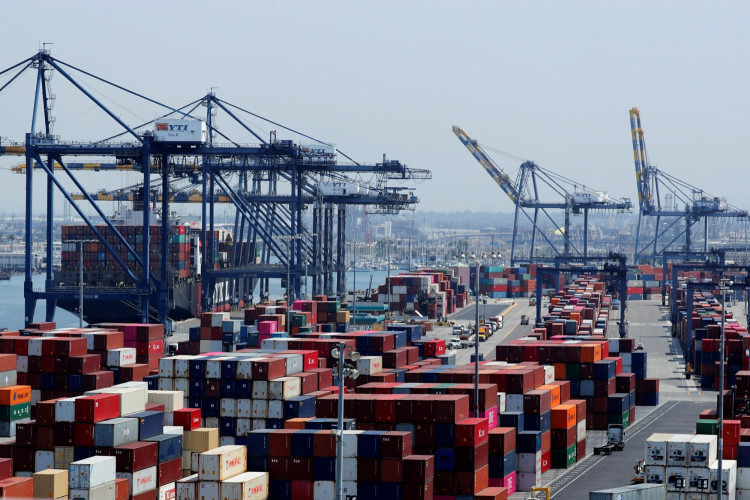U.S. and global markets fell sharply Thursday after President Donald Trump announced sweeping new tariffs on imports from dozens of countries, rattling investors and triggering swift condemnation from trade partners. Futures for the S&P 500 dropped 3.4% in premarket trading, while the Dow Jones Industrial Average slid 2.8% and the Nasdaq tumbled 3.8%, following a volatile overnight session that saw losses cascade across Asia and Europe.
The tariffs, unveiled late Wednesday, include a 10% baseline levy on all imports and higher rates on countries running significant trade surpluses with the U.S. China will face a 34% tariff-bringing its cumulative rate to 64%-while the European Union and Taiwan were hit with new levies of 20% and 32%, respectively.
"China, in particular, was hit with an additional 34% tariff, bringing its total tariff burden to 64% when accounting for previous measures," said Yeap Junrong of IG in a commentary, calling the policy a "major shock."
Trump defended the tariffs as a corrective measure to what he called decades of economic imbalance. "Taxpayers have been ripped off for more than 50 years," the president said. "But it is not going to happen anymore."
The measures drew rebuke from U.S. allies and trade partners. European Commission President Ursula von der Leyen said the move was a "major blow to the world economy," warning that "groceries, transport and medicines will cost more." Still, she stopped short of announcing retaliatory tariffs and said the EU remained open to negotiation.
Financial markets reflected investor anxiety over a broadening trade war:
- S&P 500 Futures: -3.4%
- Dow Jones Futures: -2.8%
- Nasdaq Futures: -3.8%
- U.S. 10-Year Treasury Yield: fell to 4.04% overnight, later recovering to 4.11%
- Oil Prices: Brent crude fell 4.4% to $71.66; U.S. benchmark crude slid 4.7% to $68.35
- Dollar: dropped to 146.64 yen, its lowest against the Japanese currency since early October
Retailers with overseas supply chains took an immediate hit. Shares of Nike, Best Buy, and Dollar Tree dropped more than 11% in early trading. Vietnam, a key production hub for many U.S. companies trying to sidestep earlier tariffs on China, is now subject to a 46% import duty.
Trump's tariff announcement included earlier measures targeting auto imports, steel, aluminum, and a range of goods including pharmaceuticals, lumber, copper, and microchips. Analysts warned of long-term effects if the tariffs remain in place. "You can throw most forecasts out the door, if this tariff rate stays on for an extended period of time," said Olu Sonola, head of U.S. Economic Research at Fitch Ratings.
In Tokyo, the Nikkei 225 fell 2.8% after briefly dipping 4%, while South Korea's Kospi slid 1.1%. Japan's yen strengthened as investors sought safe havens. Germany's DAX lost 2.4%, France's CAC 40 dropped 2.7%, and the U.K.'s FTSE 100 declined 1.5%.
Asian nations warned of economic disruption and said they would support key industries. South Korean Prime Minister Han Duck-soo instructed officials to assess the potential impact of the 25% tariff and "minimize damage." Thailand, hit with a 36% tariff, could see export losses of $7-$8 billion, according to Kasem Prunratanamala of CGS International.
Europe is weighing its response. French government spokesperson Sophie Primas said the EU is considering targeting U.S. digital giants such as Google, Apple, Facebook, Amazon, and Microsoft with new taxes. "We're going to target the services, for example, digital services which are not being taxed for now and could be," she told RTL radio.
Former German Chancellor Olaf Scholz said, "We must show that we have strong muscles," while emphasizing the need for an agreement. "That is the best for prosperity in the U.S., for prosperity in Europe and for prosperity in the world."
British Prime Minister Kier Starmer urged calm and diplomacy. "Nobody wins in a trade war, that is not in our national interest," Starmer told business leaders in London, emphasizing the importance of negotiating a new deal.
China's Commerce Ministry warned that it would "resolutely take countermeasures," while refraining from specific threats. In past tariff rounds, Beijing has targeted U.S. agricultural exports and limited access to minerals critical for electronics and electric vehicles.
Even U.S. allies expressed confusion over the sweeping scope of the tariffs. Norfolk Island, an Australian territory with a population of about 2,000, was shocked to discover it had been assigned a 29% tariff. "To my knowledge, we do not export anything to the United States," said George Plant, the island's administrator. "We're scratching our heads here."




